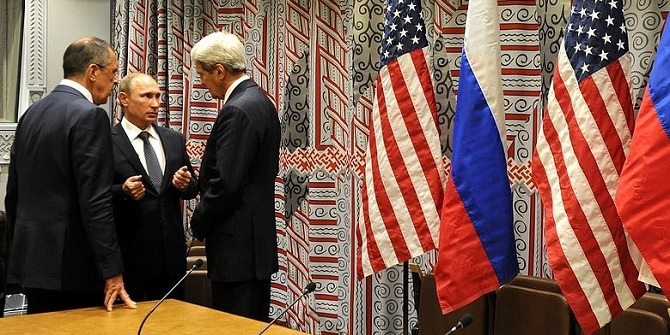 March 31st marks the deadline for an agreement to be reached in negotiations between Iran and six world powers (including the U.S.) over the future of Iran’s nuclear program. The talks have been complicated by an open letter sent by Republican Senators aimed at undermining President Obama’s negotiating position. Christian Emery writes that the nuclear negotiations are a two-level game, with both Iran and the American governments negotiating with one another and with their domestic audiences. In trying to undermine the President’s negotiating position, he argues, the Republican Party are going against public opinion and are presenting the U.S. to the world as a dysfunctional power, caused by their own narrow pursuit of partisan gains.
March 31st marks the deadline for an agreement to be reached in negotiations between Iran and six world powers (including the U.S.) over the future of Iran’s nuclear program. The talks have been complicated by an open letter sent by Republican Senators aimed at undermining President Obama’s negotiating position. Christian Emery writes that the nuclear negotiations are a two-level game, with both Iran and the American governments negotiating with one another and with their domestic audiences. In trying to undermine the President’s negotiating position, he argues, the Republican Party are going against public opinion and are presenting the U.S. to the world as a dysfunctional power, caused by their own narrow pursuit of partisan gains.
In the next two weeks Iran’s nuclear negotiators and the P5+1 could hammer out a final settlement that deescalates a 12 year crisis with the potential to drag an already devastated region into yet another catastrophic war. A successful deal will legitimize a highly circumscribed and scrutinised Iranian nuclear programme in return for the sequential lifting of the vast array of economic sanctions levied against Iran. In the absence of any other realistic alternatives, this represents by far the best chance of preventing Iran from obtaining nuclear weapons. The flip side is that Iran’s economic and diplomatic rehabilitation will increase its regional position, a source of extreme anxiety for its traditional rivals, but then again years of threats and isolation against Iran have done little to enhance international security either. Although unlikely to lead to the much touted ‘Grand Bargain’, a deal on the nuclear issue could open the way to greater cooperation on containing Sunni extremism. Both countries also share an interest in helping to build a viable state in Afghanistan, defending Iraq’s territorial integrity, and ending the slaughter in Syria. To this end, Iran has significant influence with the Assad regime of Syria, with whom Secretary of State John Kerry now admits Washington must deal with to end the brutal Syrian Civil War. If the US is serious about its once-vaunted “pivot to Asia”, then this can only be helped by freeing up military, diplomatic, and economic resources currently sucked into containing Iran.
On the other hand, if a deal is not reached, the countries that have benefited from Iran’s long conflict with the US, primarily Israel and Saudi Arabia, avoid the prospect of a US government that no longer fully shares their concerns of an emboldened Iran. A bruised Obama will leave office having neither secured his foreign policy legacy, nor scored a significant victory against the GOP’s obsessively zealous campaign of obstructionism. The anti-Iranian lobby will, rightly or wrongly, claim yet another victory.
The campaign to bring about this second scenario was escalated last week when Sen. Tom Cotton of Arkansas posted online an open letter signed by 46 other Republican senators to Iranian ‘leaders’. According to letter’s authors, the purpose was to deliver the Iranians from their ignorance as they “may not fully understand our constitutional system”. They might not be aware, the letter pointed out, that any Iranian nuclear deal reached with Obama’s team could be revoked by the next president or modified by Congress. This message was somewhat ironic given that the letter very likely exceeded constitutional limits on Congressional interference in foreign policy. Irony descended into farce when Harvard Law Professor Jack Goldsmith felt compelled to point out that Congress technically doesn’t have the power to make binding agreements and that “the Senators do not understand our constitutional system.”

It’s not immediately clear how Tom Cotton, a 37 year old freshman with just two months senatorial experience, could organise the GOP’s biggest hitters into mounting such a brazen challenge to executive authority. Some observers suggested that Cotton was just the frontman for a shadowy group of moneyed anti-Iranian hawks, including billionaires Paul Singer, Sheldon Adelson, and Dan Senor, who just a few months back had bankrolled the junior senator’s winning campaign. It emerged that Cotton had also received over $900,000 in supportive campaign advertising from the Emergency Committee for Israel, headed by the neoconservative pundit, Bill Kristol. Whatever the origins of the letter, it was soon derided coast-to-coast as a partisan attack on US diplomacy in an area of a critical importance. Somewhat inexplicably, the GOP has managed to undermine the bipartisanship that for years has been Congress’ greatest source of influence in Iran policy.
Set against an era of legislative paralysis, maintaining a hard-line on Iran has been practically the only thing Congress could agree on. Proponents of sanctions legislation could rely on hundreds of co-sponsors and staggering majorities. In 2013 Congress even appeared to offer Israel carte blanche to attack Iran, voting 99-0 to back Israel “in the event that it is required to defend itself against Iran”. The usual powerful lobby groups were of course active in pushing a hostile line, but by sheer weight of numbers, Iran policy appeared to be above spiteful partisanship or narrow domestic interests.
Until 2013, Obama was happy to play along; his advisors had told him that strengthening the sanctions regime was the best way of avoiding military action and would protect him from criticisms that he was ‘weak’ on matters of national security. Obama still boasts that he was able to ratchet up sanctions far more effectively than his predecessor, though now he does so to justify the P5+1’s decision to embrace reality and accept that the complete dismantling of Iran’s nuclear programme is simply not an option. As I have argued before, sanctions did not alone force Iran to the negotiating table, but they were devastating nonetheless: Iran’s currency collapsed, oil exports halved, and the economy to shrink by about 5 percent in 2013 as Iran’s private sector reduced operations and many of its loans became delinquent.
With domestic support for a hard-line seemingly entrenched, the Iranian nuclear negotiations produced a classic two-level game. This means both Iranian and American governments (and I deliberately exclude other members of ‘P5+1 from this dynamic) are simultaneously negotiating with each other and their respective domestic audiences. The basic idea being that winning support from domestic actors is vital but subject to domestic processes as much as strict calculations of national interest. After signing up to an interim agreement that accepted a limited Iranian enrichment capability, Obama understood that Presidential vetoes could not hold back Congressional opposition for ever. To sell the deal at home and abroad he would have to extract a substantial reduction in Iran’s core demand for quick sanctions relief and impose severe restrictions on its nuclear programme. From the perspective of the Rouhani administration in Iran, their domestic bargaining was in some ways simpler but subject to more fluid political dynamics. Simpler because just one person holds a veto on matters of foreign policy, Supreme Leader Ayatollah Khamenei, but more fluid because Khamenei is highly sensitive to domestic currents in Iran’s multi-layered and factionalised political system. Iranian nuclear negotiators would have to be sensitive to intense criticism that they were giving away too much and bargain for Khamenei’s protection from hardliners. For this reason, Iran let two deadlines pass and consistently frustrated the P5+1 by refusing to dismantle key nuclear facilities.
So how has the two-level game been altered by the GOPs recent shenanigans? Firstly, it’s unlikely that Tom Cotton or Bill Kristol really believe that the Iranians require a constitutional lesson. More likely they are deliberately trying to reinforce Ayatollah Khamenei’s known fear that the next US president could renege on any deal. In this sense, the two level game has become multi-directional as US domestic actors try to undermine the attempt by Iranian negotiators to build a package acceptable to their domestic constituents. But by intervening in the Iranian domestic process, the GOP might hasten the political revival of Iranian hardliners at the same time as they erode bi-partisan support for confronting them.
Coming just days after Republican House Speaker John Boehner invited Israeli Prime Minister Benjamin Netanyahu to excoriate the talks as a ‘bad deal’ at a joint meeting of Congress, the domestic context in which Obama will present any deal with Iran has also been altered in a way that is unlikely to benefit the hawks. The key to Obama’s domestic bargaining is to increase the costs for those who will have to actively destroy a deal that is acceptable not just to the US executive branch but key European allies. This becomes even harder if Iran is seen to be keeping its side of the bargain. In opposing a deal, Congress is already acting against the wishes of most Americans; now the GOP will be seen to be doing so on the basis of a pathological hatred of Obama, a disregard for diplomatic protocol, and a subservience to moneyed domestic lobbies. If criticism of GOP sabotage continues to grow, Obama may even feel confident enough to seek UN Security Council ratification for the deal. This could mean that Congress or the next President can reimpose congressional sanctions only by violating international law. In foreign policy, the reverse gear is often hard to find. Senator Cotton may just have made it harder.
At the same time as criticising Obama for abrogating America’s role as the ‘indispensable state’, GOP leaders are effectively telling the world that the President’s word is not to be taken seriously. No wonder America’s European allies are horrified. In their lust to snuff-out Obama’s political legacy, the GOP present the image of a dysfunctional superpower incapable of making decisions according to calculations of its own interests, let alone those of the international community.
Please read our comments policy before commenting.
Note: This article gives the views of the author, and not the position of USApp– American Politics and Policy, nor of the London School of Economics.
Shortened URL for this post: http://bit.ly/1EYr493
_________________________________
 Christian Emery – University of Plymouth
Christian Emery – University of Plymouth
Christian Emery is a Lecturer in International Relations at the University of Plymouth. He completed his PhD at the University of Birmingham and was a Fellow in the Department of International Relations at the London School of Economics between 2010 and 2013. He is the author of several articles and book chapters on US foreign policy and US-Iranian relations and he has written for a variety of mainstream media outlets. ‘US Foreign Policy and the Iranian Revolution‘ (Palgrave, 2013) is his first monograph.







Really good article with lots of intelligent points. As a Canadian I am baffled by the Conservative’s hatred of Obama to the point they are willing to harm their own country. Their scorched earth policy is not only alarming the support for it by a significant portion of the populace is terrifying. As someone on the outside looking i n I am embarrassed for your country.